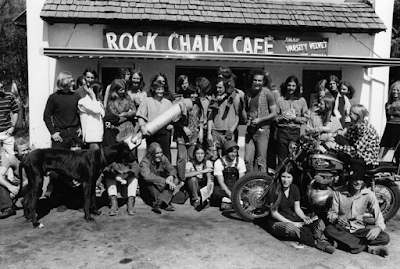An article about the literary scene in Lawrence, Kansas in the 70s by Stephen Bunch
The
Rock Chalk Cafe
In
yesterday’s news, linked above, comes word that a storied Lawrence,
Kansas, watering hole may be about to vanish from the north edge of
the University of Kansas campus. Among its distinctions the Rock
Chalk Café, now known as The Crossing, holds a place in local
literary history.
Edward
Dorn's poem "The Cosmology of Finding Your Spot" celebrated
the Rock Chalk and its denizens (http://www.vlib.us/beats/dorn.html
) and was published (typos and all) as a broadside in connection with
a reading in support of the Draft Resisters League in 1969. The
reading occurred just across the street from the Rock Chalk, at the
United Campus Christian Fellowship building. As I recall, Robert Bly
also read that evening. Robert Creeley, Robert Duncan, Galway
Kinnell, and Diane Wakoski also came through Lawrence that spring.
George
Kimball, poet, sportswriter, candidate for Douglas County sheriff in
1970, presided at the Rock Chalk. He wore a revolver in a holster on
his hip and had one eye. His campaign slogan was that he would keep
an eye on crime. (George was known to drop his glass eye into his
glass of beer when holding forth at the Rock Chalk.) He lost the
election, but went on to become a respected sports writer
(http://www.thesweetscience.com/news/articles/12903-george-kimball-1943-2011
). A fellow traveler write-in candidate was elected justice of the
peace and announced he would marry gay couples. The state of Kansas
quickly eliminated retroactively the office of justice of the peace.
Around
the corner and upstairs from the Rock Chalk was the Tansy book store,
John Moritz proprietor. John was a printer, poet, and publisher,
whose Tansy Press produced a magazine, occasional broadsides but more
importantly several books by Kenneth Irby. The story of Tansy Press,
complete with a bibliography, can be found here:
https://fromasecretlocation.com/tansy/.
The
book store stocked small press publications seldom found elsewhere:
important literary magazines of the times, such as Caterpillar,
kayak, Io; books by such publishers as Four Seasons,
Frontier Press, City Lights, Black Sparrow Press, Totem/Corinth; and
books by better-known but still niche publishers such as New
Directions and Grove. The so-called underground newspapers of the
day, both local and national, were available there.
Tansy
also was the site for occasional poetry readings. The audience would
occupy the few folding chairs but mostly sat on the floor. A gallon
jug of cheap burgundy sometimes circulated while local writers
regaled the listeners with everything from poems to songs to letters
to mother to a shopping list found in the pocket of the reader’s
blue jeans.
In the
early '80s Allen Ginsberg was the honored guest at a large lunch
gathering at the Rock Chalk (by then it may have become the Crossing,
I don’t remember). At lunch he signed my old copy of Grist
magazine, edited and published by John Fowler out of the old Abington
Bookshop, which was formerly just down the street from the Rock
Chalk. This particular issue of Grist contained an excerpt
from "Wichita Vortex Sutra." This gathering was videotaped
by philosophy professor Don Brownstein. Many years later I tracked
down Don, who had left the university to become a hedge fund broker
in New York City, to ask what had become of the tape. He vaguely
recalled making it but, sadly, didn’t know if it had survived his
moves over the years.
After
that lunch, Ginsberg joined Kemp Houck, English professor at the time
(before dropping out of academia to become an anti-nuke activist),
and me that afternoon to record an interview about his memories and
thoughts regarding Charles Olson. Kemp was an Elizabethan scholar who
had become obsessed with Olson’s life and work. The interview was
held at the kitchen table in my house at 1005 Rhode Island, but we
had to persuade Ginsberg to leave the Hammond organ in the dining
room, at which he seemed content to play endlessly. At the table, we
drank apricot nectar and Ginsberg recounted a party with Olson and
the Beatles in London. At one point he asked the time and said he
needed to go to “Mr. Burroughs’” house, which was nearby. I
thought it charming somehow that he referred to his old friend so
formally. Unfortunately, Kemp managed inadvertently to erase much of
the tape. Somewhere in my files is a transcript of the tail end of
the interview. That evening Ginsberg read to a standing room only
audience, probably around 800 or so, in the Kansas Union Ballroom,
also just down the street from the Rock Chalk Cafe. William Burroughs
and Andrei Codrescu were in attendance. Steven Taylor, of the Fugs,
played guitar.
The
Rock Chalk Café was a center of culture, celebration, and commotion
during the Vietnam era. An energy radiated from it every bit as
perceptible as the sound of Creedence Clearwater Revival's "Bad
Moon Rising" thumping from its jukebox, which I could hear from
my future (and current) wife’s bedroom window a half block away
down Oread Avenue in 1969.
Stephen Bunch lives and writes in Lawrence, Kansas, where he received the 2008 Langston Hughes Award for Poetry from the Lawrence Arts Center and Raven Books. His poems can be found in Autumn Sky Poetry, The Externalist, The Literary Bohemian, Fickle Muses, IthacaLit and Umbrella. From 1978 to 1988, he edited and published Tellus, a little magazine that featured work by Victor Contoski, Edward Dorn, Jane Hirshfield, Donald Levering, Denise Low, Paul Metcalf, Edward Sanders, and many others. After a fifteen-year hibernation, he awoke in 2005 and resumed writing. Preparing to Leave, his first gathering of poems, was published in 2011 and Transmissions from Bone House, his second, in 2016. Bunch can be found on the Map of Kansas Literature near L. Frank Baum and Gwendolyn Brooks. [He reports that property values tanked when he moved into the neighborhood.



































